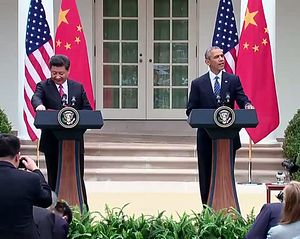In reporting on the recent agreement between China and the United States not to undertake commercial espionage against each other, many leading commentators, such as those at the Washington Post and in Council on Foreign Relations blog, have referred to this as an agreement not to undertake economic intelligence collection. It is not.
The CFR blog went so far as to claim imminent global application of a norm against economic espionage. There is no international legal norm of any kind against economic cyber espionage if the act is confined to merely collecting of information. There are international legal agreements that apply penalties or redress options for unauthorized commercial applications of intellectual property (often called industrial espionage).
And there are norms against disturbing the peaceful domestic order of a sovereign state but no state interprets this to prohibit, in international legal terms, covert espionage where the domestic disorder that results is confined only to the theft of the information and unauthorised access to buildings or networks.
As noted in my recent commentary in The Diplomat, it is declared U.S. policy to undertake economic intelligence collection against other countries, especially when it relates to their science and technology (S&T) capabilities and advanced industrial designs.
This can be contrasted with “commercial intelligence,” defined by the White House last week, as intelligence collected “with the intent of providing competitive advantages to companies or commercial sectors.” This differs from economic espionage, which most states undertake to protect and advance national economic interests. But the distinction may not be so black and white.
In the case of the United States, one purpose of S&T intelligence (which includes obtaining the design secrets of foreign governments and companies) is to “to provide a comprehensive picture of global scientific and technological advancements.” This is laid out in the 2013 Report of the National Commission for the Review of the Research and Development Programs of the United States Intelligence Community, Unclassified Version. This report on U.S. S&T intelligence (S&TI) called out the high priority to be attached to this:
Failure to properly resource and use our own R&D to appraise, exploit, and counter the scientific and technical developments of our adversaries—including both state and non-state actors—may have more immediate and catastrophic consequences than failure in any other field of intelligence.
The report opens with the statement that “the global spread of scientific and technical knowledge challenges U.S. national security.” The United States officially acknowledges that it pursues S&TI to “counter” the scientific advances of other countries. Since the main S&T research efforts are in private hands in the United States, then it is inevitable that the government would have to pass S&T intelligence to them so that they could counter the foreign advances.
Additional research today throws more light on the scale of this practice. In a report by the U.S. Director of National Intelligence on industry partnerships, “Industry Snapshot: Summary of Partner Responses to the FY 2015-2019 IC S&T Investment Landscape,” the intelligence community observed that some 10,000 “cleared companies” are its potential partners in understanding foreign industry-related intelligence. While this report relates only to technologies relevant to the intelligence community, this covers a vast field not only in collection methodologies but also in content-related exchange of information on strategic technologies.
So in economic espionage by one state against another, there are really few holds barred.
Key U.S. documents repeatedly refer to foreign technologies as a potential threat to the country’s strategic pre-eminence. They can be a threat, but it may be time for the United States to contemplate whether it can make a re-assessment on that front against the certainty that “knowledge has no flag.”
































